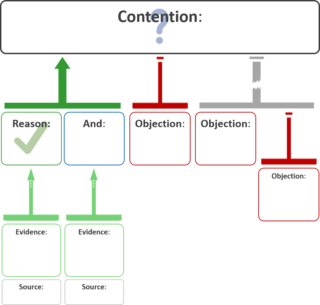Related Research Articles
Ad hominem, short for argumentum ad hominem, refers to several types of arguments, some but not all of which are fallacious. Typically this term refers to a rhetorical strategy where the speaker attacks the character, motive, or some other attribute of the person making an argument rather than attacking the substance of the argument itself. This avoids genuine debate by creating a diversion to some irrelevant but often highly charged issue. The most common form of this fallacy is "A makes a claim x, B asserts that A holds a property that is unwelcome, and hence B concludes that argument x is wrong".
A straw man is a form of argument and an informal fallacy of having the impression of refuting an argument, whereas the proper idea of the argument under discussion was not addressed or properly refuted. One who engages in this fallacy is said to be "attacking a straw man".
A fallacy is the use of invalid or otherwise faulty reasoning, or "wrong moves" in the construction of an argument. A fallacious argument may be deceptive by appearing to be better than it really is. Some fallacies are committed intentionally to manipulate or persuade by deception, while others are committed unintentionally due to carelessness or ignorance. The soundness of legal arguments depends on the context in which the arguments are made.
Philosophical logic refers to those areas of philosophy in which recognized methods of logic have traditionally been used to solve or advance the discussion of philosophical problems. Among these, Sybil Wolfram highlights the study of argument, meaning, and truth, while Colin McGinn presents identity, existence, predication, necessity and truth as the main topics of his book on the subject.
Categorical logic is the branch of mathematics in which tools and concepts from category theory are applied to the study of mathematical logic. It is also notable for its connections to theoretical computer science. In broad terms, categorical logic represents both syntax and semantics by a category, and an interpretation by a functor. The categorical framework provides a rich conceptual background for logical and type-theoretic constructions. The subject has been recognisable in these terms since around 1970.

Argumentation theory, or argumentation, is the interdisciplinary study of how conclusions can be reached through logical reasoning; that is, claims based, soundly or not, on premises. It includes the arts and sciences of civil debate, dialogue, conversation, and persuasion. It studies rules of inference, logic, and procedural rules in both artificial and real world settings.

Jean-Yves Béziau is a professor and researcher of the Brazilian Research Council (CNPq) at the University of Brazil in Rio de Janeiro.
Dov M. Gabbay is an Israeli logician. He is Augustus De Morgan Professor Emeritus of Logic at the Group of Logic, Language and Computation, Department of Computer Science, King's College London.
Douglas Neil Walton was a Canadian academic and author, known for his books and papers on argumentation, logical fallacies and informal logic. He was a Distinguished Research Fellow of the Centre for Research in Reasoning, Argumentation, and Rhetoric (CRRAR) at the University of Windsor, Ontario, Canada, and before that (2008–2014), he held the Assumption Chair of Argumentation Studies at the University of Windsor. Walton's work has been used to better prepare legal arguments and to help develop artificial intelligence.

An argument map or argument diagram is a visual representation of the structure of an argument. An argument map typically includes the key components of the argument, traditionally called the conclusion and the premises, also called contention and reasons. Argument maps can also show co-premises, objections, counterarguments, rebuttals, and lemmas. There are different styles of argument map but they are often functionally equivalent and represent an argument's individual claims and the relationships between them.

Informal logic encompasses the principles of logic and logical thought outside of a formal setting. However, perhaps because of the "informal" in the title, the precise definition of "informal logic" is a matter of some dispute. Ralph H. Johnson and J. Anthony Blair define informal logic as "a branch of logic whose task is to develop non-formal standards, criteria, procedures for the analysis, interpretation, evaluation, criticism and construction of argumentation." This definition reflects what had been implicit in their practice and what others were doing in their informal logic texts.
Rob Grootendorst was a Dutch communication and argumentation theory scholar. He was professor for Dutch speech communication at the University of Amsterdam. His contributions to the argumentation field include the co-foundation of the pragma-dialectic school in argumentation theory.
In argumentation theory, an argumentum ad populum is a fallacious argument that concludes that a proposition must be true because many or most people believe it, often concisely encapsulated as: "If many believe so, it is so".
Dialogical logic was conceived as a pragmatic approach to the semantics of logic that resorts to concepts of game theory such as "winning a play" and that of "winning strategy".
Frans Hendrik van Eemeren is a Dutch scholar, professor in the Department of Speech Communication, Argumentation Theory and Rhetoric at the University of Amsterdam. He is noted for his Pragma-dialectics theory, an argumentation theory which he developed with Rob Grootendorst from the early 1980s onwards. He has published numerous books and papers, including Strategic Maneuvering in Argumentative Discourse.
Howard Kahane was an American professor of philosophy at Bernard M. Baruch College in New York City. He was noted for promoting a popular, and non-mathematical, approach to logic, now known as informal logic. His best known publication in that area is his textbook Logic and Contemporary Rhetoric: The Use of Reason in Everyday Life, now at the 12th edition, published in 2014.

Harald R. Wohlrapp is a German philosopher. His main focus is argumentation theory.

Andrew David Irvine is a Canadian academic who teaches at the University of British Columbia. He holds a PhD in philosophy from Sydney University and is a professor of philosophy and mathematics at UBC Okanagan. He is a past vice-chair of the UBC Board of Governors, a past head of the Department of Economics, Philosophy and Political Science, a past president of the British Columbia Civil Liberties Association, and a member of the board of directors of the Society for Academic Freedom and Scholarship. An advocate of traditional democratic civil liberties, Irvine has written about the importance of the rule of law for both modern and ancient democracies. He has held visiting positions at several Canadian and American universities and has been recognized as one of British Columbia's most influential public intellectuals.
Formal scientists have attempted to combine logic and dialectic through formalisation. These attempts include pre-formal and partially formal treatises on argument and dialectic, systems based on defeasible reasoning, and systems based on game semantics and dialogical logic.
In argumentation theory, an argumentation scheme or argument scheme is a template that represents a common type of argument used in ordinary conversation. Many different argumentation schemes have been identified. Each one has a name and presents a type of connection between premises and a conclusion in an argument, and this connection is expressed as a rule of inference. Argumentation schemes can include inferences based on different types of reasoning—deductive, inductive, abductive, probabilistic, etc.
References
- ↑ F. H. van Eemeren (2001). Crucial concepts in argumentation theory. Amsterdam University Press. p. 154. ISBN 978-90-5356-523-0.
- ↑ A. D. Irvine; Kent A. Peacock; John Hayden Woods (2005). Mistakes of Reason: Essays in Honour of John Woods . University of Toronto Press. ISBN 978-0-8020-3866-1.